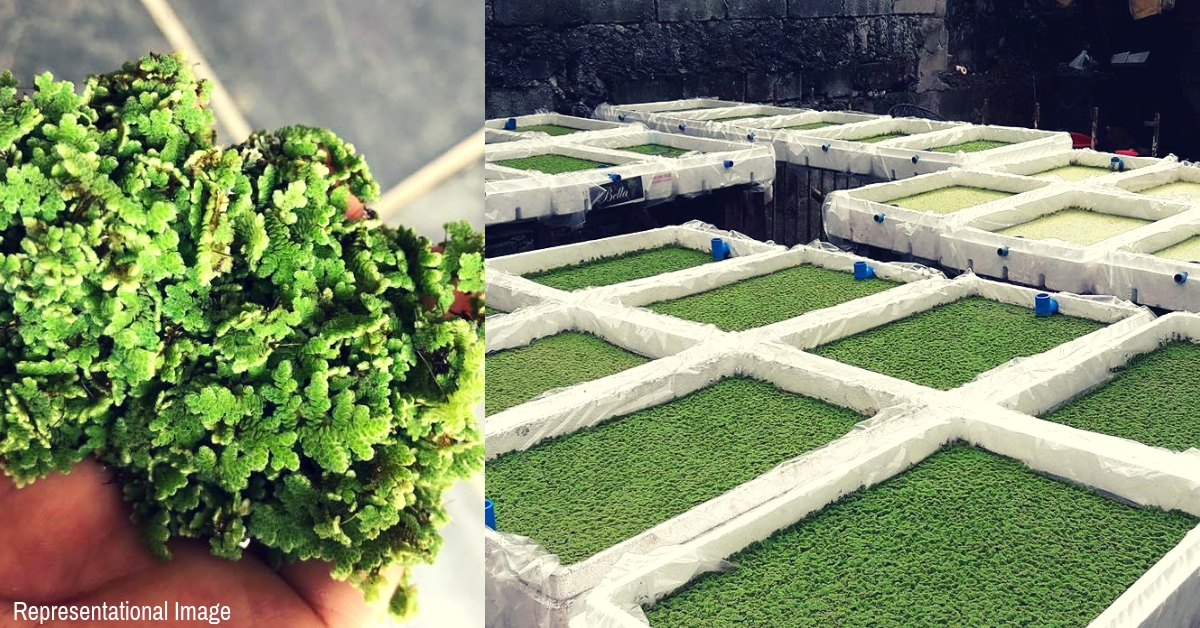Tamil Nadu Organic Farmer Uses Aquatic Fern to Increase Paddy Cultivation by 35%!
“The benefit of using Azolla is that it is locally available and inexpensive. It is cheap and renewable."

The last few years have witnessed rising farmer suicides.
The reason?
Mounting debts and land turning unsuitable for agriculture after being doused with chemical fertilisers!
While it may seem like the Indian farmer’s dependence on chemicals helps increase productivity in the short term, consequences, in the long run, are irreparable.
Besides, the cost of these chemical fertilisers continues to burn holes in their pockets.
But one organic farmer from Tamil Nadu has proven how Azolla (considered a weed in most parts of the world) can effectively be used as a bio-fertiliser to increase the production of paddy by 30 to 40 per cent.

Hailing from Mayiladuthurai Taluka, S Ramuvel started farming on their 10-acre farm at the age of 15, along with his father.
While the young farmer resorted to the use of chemicals at the start, in the year 2000, he switched to organic farming.
The 43-year-old may have now shifted to cultivating sugarcane after paddy prices fell, but he continues to be a promoter of the humble fern. He confesses how he turned to Azolla for its weed-control and nitrogen-fixation properties after learning about them from the Centre for Indian Knowledge Systems, an NGO that promotes organic farming.
Before turning to Azolla, the farmer relied on the panchakaviyam mixture. This is made using five litres of cow dung, the same amount of cow urine, three litres of milk, two litres of curd, 18 bananas, three litres of coconut water and two litres of sugarcane extract.
This mixture is stirred daily. After 15 days, 10 per cent of the resulting solution is mixed with water and used as fertiliser.
The difference between the two bio-fertilisers is–while Azolla decomposes in the soil as manure and provides nitrogen to it, panchakaviyam could be directly sprayed to the plants that absorbed it.
What is Azolla really?
Azolla is a very common free-floating aquatic fern. It can be found in moist soil, ditches, and pools, and is a highly productive plant. It doubles its biomass in 10–15 days if the conditions are right.
The fern’s nitrogen-fixing capability makes it an excellent alternative to chemical fertilisers. In China, for over 1,000 years, Azolla has been used as a bio-fertiliser to bolster agricultural productivity.
When it is sprayed on the paddy field, it quickly multiplies and forms a dense green mat over the water. This not only releases nitrogen for the plants but also acts as weed-control for the crop.
According to a report in The Hindu, the basal application of green Azolla manure at the rate of 10-20 tonnes per hectare increases soil nitrogen by 45-60 kg and reduces 20-30 kg of nitrogenous fertiliser requirement of the rice crop. This information has been highlighted by the Tamil Nadu Agricultural University (TNAU), Coimbatore.
Ramuvel used this property of the fern as a substitute of urea for paddy crops. He adds, how apart from its use as an eco-friendly fertiliser, Azolla can also be used as feed for cattle, ducks, pigs, and fish, owing to its high protein content.
Benefits of Azolla
“The benefit of using Azolla is that it is locally available and inexpensive. It is cheap and renewable. If you don’t want to rely on the market to buy it, you can grow it in your own nursery by buying a kilo or two, and adding it to a 2-ft pit filled with water. Within a few days, it multiplies on its own. You can then cultivate it from the pond and release it into the paddy field,” says Ramuvel.
Azolla can also be used as compost by drying it and mixing it with the soil to be used as farm manure. Since rice cultivation is a water-intensive technique, the Azolla that forms a dense green mat on the surface of the water in the field prevents water evaporation. Thereby making the process of cultivation water-efficient too.
Earlier, paddy cultivation using chemical fertilisers cost him Rs 1,500 per acre, but the use of Azolla as a bio-fertiliser has cut down the cost of production by 25 per cent and increased the paddy yield by 30-40 per cent.
Unlike chemical fertiliser that would increase the yield for a shorter duration and leave poisonous remnants, even after the water in a paddy field evaporates, Azolla retains in the soil and continues to strengthen it.
Also Read: Seeking Fresh Produce, Mumbai Duo Quits Jobs to Grow over 1,000 Plants Soil-Less!
“The field keeps the farmer alive, so it is our responsibility to keep it healthy and young. There is no better way to ensure this other than organic farming. Chemical fertilisers are relatively new and a short-term answer. But organic farming has been around for ages. Say ‘no’ to chemicals and turn to green manure. It’s the best way to ensure that the land is nourished,” Ramuvel signs off.
(Edited by Shruti Singhal)
Like this story? Or have something to share?
Write to us: [email protected]
Connect with us on Facebook and Twitter.
This story made me
- 97
- 121
- 89
- 167
Tell Us More
We bring stories straight from the heart of India, to inspire millions and create a wave of impact. Our positive movement is growing bigger everyday, and we would love for you to join it.
Please contribute whatever you can, every little penny helps our team in bringing you more stories that support dreams and spread hope.



















